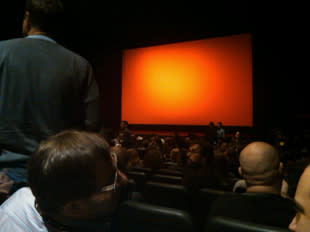Denouement: Surviving the Toronto Film Festival Experience

Tim Grierson will be leaving Wednesday morning for the Toronto Film Festival, where he'll be filing posts and reviews for The Projector. Before he takes off, we asked him what going to a film festival means to him.
The first time I ever went to a film festival was Sundance, and it didn't start promisingly. After you land at the Salt Lake City airport, you have to sign up for a shuttle that takes you and a bunch of random strangers to Park City. It's about a 45-minute drive, but my first trip felt about four times as long. I was surrounded -- trapped, really -- by folks who were apparently going to Sundance just to schmooze, get into parties and do some skiing. If they had some free time, maybe they'd see a movie if they could, but probably not. They all worked in the film business, but not one of them seemed to like movies at all. I didn't want my first film festival experience to go like this.
That memory has stayed with me because whenever I go to a film festival I like to remember it's really about the movies. That's a cliche, of course, but it's one whose spirit very quickly gets forgotten in the rush of navigating through dozens of screenings happening every single day. For critics and industry folks attending an international festival like Toronto, it can be easy to let other things get in the way: "Do I have the most exclusive pass? Am I staying in the best hotel? Am I seeing the most prestigious films? Am I a big deal?" It's all about access and exclusivity. If you're not careful, it's also a way to gauge your entire self-worth in the business.
But it really shouldn't because, in the end, it's about the movies. Thankfully this year's Toronto Film Festival has a ton of them, and that's what I'm looking forward to the most about my 11-day stay. And it's not just the amount of movies, but the variety of them. It's very possible that in the span of one day I'll see a love story from France, an American indie, a Turkish police drama, and then a horror movie. They rush at you one after another, creating unexpected connections that often inform and strengthen each film while suggesting trends affecting filmmakers from across the globe. If, like me, you initially got turned on to movies because of the way they opened up the world, then going to Toronto is to have your antenna tuned in to what the entire planet is thinking and feeling. There's nothing quite like it.
Of course, it can also be pretty wearying if you don't watch it. I vaguely remember in my childhood Gene Siskel talking about the occupational hazard of being a critic, which was that sometimes he had to watch three movies a day. His audience had little sympathy for his plight, but it's a fact that if you want to write intelligently about what you've seen at a festival, it takes a certain amount of mental discipline and endurance -- if for no other reason than to keep track of each movie's specific plot points. (Did Emma Stone's character have a brother or a sister in this morning's movie? How long ago were the flashbacks supposed to take place in that Robert De Niro drama? Where those characters sisters or friends?) Movie reviewing is always about taking your best guess under specific circumstances, but at a film festival you're battling exhaustion, hunger and burnout. And yet it's never about you. It's about the film and trying to do your best to accurately assess what's there on the screen. No wonder critics want to go into hibernation after a film festival.
But that's two weeks from now. At the moment, there's only the excitement of what I'm going to see and what I might discover. Toronto will be tiring, but I also imagine it's going to help remind me all over again why I find movies so life-affirming. If I miss your party, please don't take offense: I'm too busy doing something I love.

 Yahoo Movies
Yahoo Movies 
